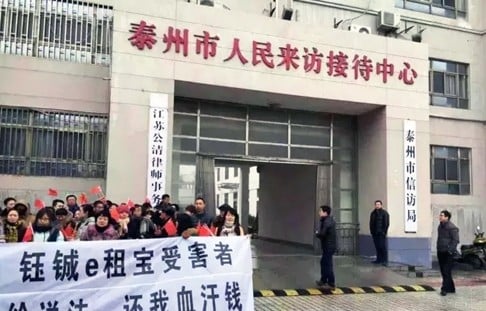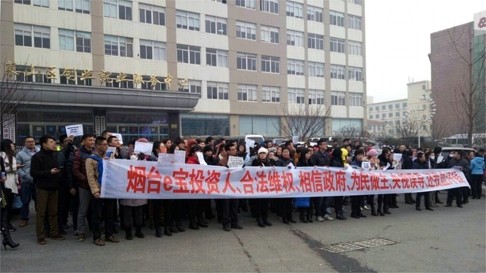China’s HK$59 billion online Ponzi scheme: who started it, how did it happen and now what?
We give you the low-down on the massive scam involving a peer-to-peer online financing firm that fleeced more than 50 billion yuan from over 900,000 investors across China in just 1½years
PUBLISHED : Monday, 01 February, 2016, 2:24pm
UPDATED : Tuesday, 02 February, 2016, 8:31pm
Zhou Xin
[email protected]

The faces behind China’s Ezubao Ponzi scheme: Ding Ning, Zhang Min and Yong Lei.
Who started Ezubao?
Ding Ning, 34, was the mastermind behind the Ponzi scheme.
A vocational school dropout from China’s eastern Anhui province, Ding worked as a salesman at his family’s hardware workshop. Around year 2000, he secured a few “fairly big” orders for his family business through harnessing the power of the internet.
According to local media reports, Ding had no finance or banking experience.
He was somewhat successful in China’s niche market of making can openers and nuts and bolts, but his profit margin narrowed quickly amid rising cost and increasing competition.
He then began engaging in privating lending and borrowing, setting up Anhui Yucheng as a small financing firm.
The overnight popularity of e-finance products in China spurred Ding to start his own peer-to-peer online financing platform to “channel private funds into real economic activities”.
A few months later, in July 2014, Ezubao was born.
As money poured in for his new business, Ding had to reassure his investors that their money was being properly used and managed.
He attended public events, giving speeches on innovation, and was even interviewed by the official government news portal last July to share how his business was helping to boost the country’s economic development.
Ding wanted his investors to see him as being super rich.
All his employees were required to clad themselves in luxury brands and costly jewellery to “display a positive company image”, according to Xinhua. Once, he even swept the shelves of a store of a luxury brand.
Ding tried to make his chief executive, a young woman by the name of Zhang Min, the public face of Ezubao.
He showered Zhang with gifts, including a villa in Singapore valued at 130 million yuan (HK$153 million), a 12-million-yuan pink diamond ring and 550 million yuan in cash, Xinhua reported.
Ding is now under arrest for allegedly having committed various crimes.
These include illegally taking public deposits, illegally raising funds by cheating, and illegally possessing guns.

A video grab from a CCTV programme showing Ding Ning being taken away and cases full of cash found in raids on Ezubao’s office.
How did Ezubao raise so much money in such a short time?
While Ezubao’s Ponzi scheme is smaller than that of Bernie Madoff’s in the United States, it managed to raise more than 50 billion yuan in just 1½ years.
Internet financing has gained massive popularity in China in recent years as hundreds of millions of Chinese consumers discovered that they could obtain high returns through just a few swipes on their mobile phones.
Various P2P financing programmes and platforms sprouted, with the country’s internet giants including Alibaba and Tencent leading the e-finance wave with their popular wealth management products.
While the majority of the products offer genuine investment schemes and bridge real borrowers with lenders, the general public lack the information and know-how to distinguish the good from the bad.
More often than not, potential investors simply sign up for the scheme that offers the highest returns.
Ezubao offered investors annual returns between 9 and 14.6 per cent – much higher than bank deposit rates – basically promising that every penny put into its programmes would guarantee earnings.
The firm also set no threshold for investment, so people could invest even as little as one yuan in the company.
To boost sales, Ding adopted a strategy to win the Chinese market’s attention and confidence.
He spent at least 150 million yuan on television commercials, having Ezubao broadcast on almost every TV channel across China, including on the state-run CCTV.
As state TV is often seen as a government mouthpiece, the public can be misled into believing that commercials aired on CCTV were endorsed by the government.

Angry investors stage a protest against Ezubao in Taizhou, China’s eastern Jiangsu province, in January.
How was the Ezubao Ponzi scheme exposed?
Police opened investigations into Ezubao in December after it became clear that the scheme was unsustainable.
But the case is proving a challenge for investigators, who are facing a network of at least 200 computer servers and a multitude of places and people linked to the scheme.
To conceal evidence, Ezubao’s executives allegedly put more than 1,200 account books into 80 plastic bags and buried them some six metres under ground in a suburb in Anhui, Xinhua reported.
Police spent more than 20 hours digging up the evidence using two excavators.
Investigators, alongside the central bank and banking regulator, are still tracking the flow of the money.
The Ministry of Public Security would soon provide a link to a website for victims of the Ponzi scheme to register their information, according to Xinhua.
At least 21 people are presently under formal arrest in connection with the Ezubao Ponzi scheme.
Police have also required “those who may have been involved in the crime” to turn themselves in.

Investors scammed by Ezubao in Yantai, China’s northeastern Shandong province.
How was such a scam allowed to happen?
While human greed and ignorance has always been a common factor contributing to the success of any Ponzi scheme, Ezubao reflected a regulatory loophole in China’s financial realm.
Ezubao’s operators made up as much as 95 per cent of the projects listed on its website and used funds from new investors to pay old debts, Xinhua reported Yong Lei, the firm’s risk controller, as saying.
China has three financial regulators for securities, banking and insurance, but none of them is fully equipped to effectively supervise the country’s fast-growing internet-based financing activities.
In just 1½ years, Ezubao managed to raise funds from some 900,000 people across the country, and then misused the money to support company employees’ luxurious lifestyles and extravagant projects.
According to earlier reports by financial magazine Caixin, some Ezubao funds were used to set up a bank in northern Myanmar.

Another protest against the online financing firm in Nanjiang, China’s eastern Jiangsu province.
Now what?
The collapse of Ezubao, as well as a few other financing schemes, and associated protests by angry investors, have pushed Beijing to be more alert of the risks involved in such e-financing models.
The People’s Bank of China, along with nine other ministerial bodies, last July issued a guideline on internet finance to set clearer rules.
President Xi Jinping has listed financial risk management as one of China’s priorities for “economic work” this year.
The ruling Communist Party’s political and legal affairs committee – the agency in charge of courts and the police force – has also pledged to start a nationwide campaign against illegal financing deals and activities conducted online.


